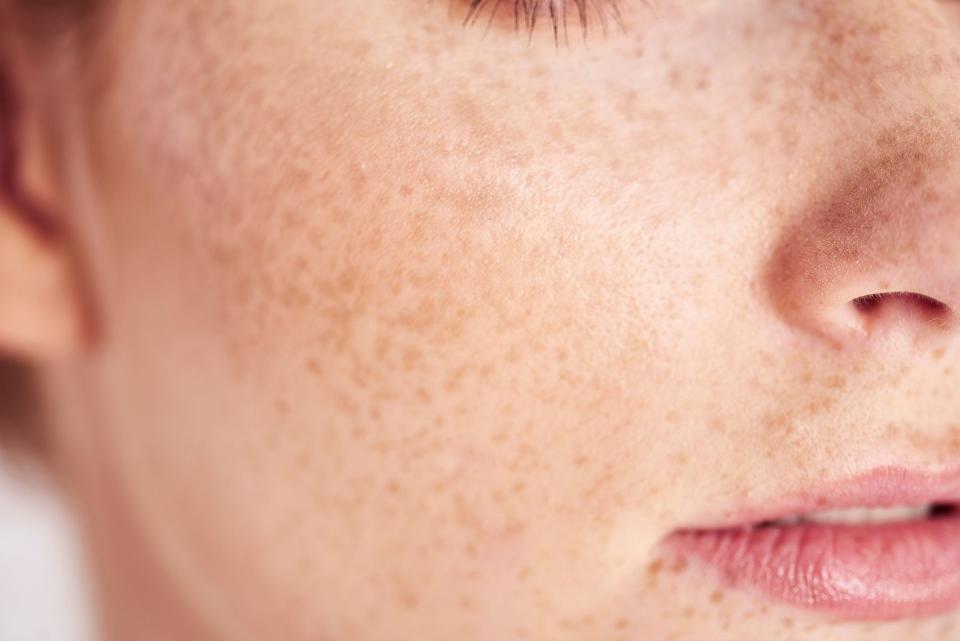Career Tips I Wish I Knew Before Becoming a Dermatologist

Skincare is having a major moment right now. Whether you're poking around YouTube or scrolling Instagram, there's an 1,000% chance you'll encounter an ad for a magical new serum or an influencer's review of a potentially suss face mask. If you're completely fascinated by all things skin, then a career in dermatology could be the move for you.
But right off the bat, it's important to understand the difference between so-called "skin experts" and actual certified dermatologists. "There's a rise in people becoming what we call 'providers,' which is like this bundled, ambiguous group of people who see patients," warns board-certified dermatologist Dr. Rachel Nazarian. "This includes nurse practitioners, physician assistants, and people that used to be called mid-levels that now also sometimes get called dermatologists and are not dermatologists."
If you're interested in entering the official field of dermatology, Dr. Nazarian and board-certified derm Dr. Terri P. Morris are here to share knowledge based on their own careers. Below, what you need to know before becoming a dermatologist.
You don't need to major in a specific subject to become a dermatologist.
And in fact, Dr. Nazarian actually recommends that you spend time in undergrad studying subjects beyond biology or chemistry. "This is the time to study things other than medicine," says Dr. Nazarian. "If you're interested in dermatology, it helps to know psychology, anthropology—even a little bit of art helps if you're going into cosmetic dermatology." Whatever you choose to major in, keep in mind that you will need to take certain pre-requisite classes in order to apply to medical school.

Even once you're in medical school, you don't have to declare your interest in dermatology immediately.
Dr. Morris pretty much stumbled into dermatology by accident. Originally, she was focusing on multiple sclerosis research and neurology, after majoring in microbiology in undergrad. "I did my first neurology rotation at the very beginning of my last year of medical school and found it so depressing," remembers Dr. Morris. "I did two more neurology rotations thinking somewhere else, things would be better, but it was just a very depressing specialty and I didn't think I would be able to do that as a career. Because of my background in research, I did a rotation with a dermatologist, and he suggested I go into dermatology because it's a fun specialty. I found that in derm, I could do a lot of different things and still use my research background while working with patients."
Having a background in research will make you a better physician.
Dr. Morris really values the time she spent in research. "It helped me get into derm in the first place because it set me apart while I was applying. But it's also helped me in my approach to patients, and it influenced my approach to figuring out the cause of rashes and the best way to control them, instead of just giving a cream or a shot to make them feel better as a temporary solution."

Plan accordingly: It takes over a decade to become a derm.
Like any medical professional, becoming a dermatologist requires *years* of schooling. Aside from earning your bachelor's degree, you must attend an additional four years of medical school. After passing several major exams, you then apply to a residency, which takes another four years to complete. Some people choose to focus on sub-specialties within the field, such as cosmetic or surgical dermatology, and in that case, it takes another year or two to complete a fellowship. All in all, expect a bare minimum of 12 years of schooling before becoming a certified dermatologist.
A lot of people want to be in this field, so you need to stand out.
Dermatology is a great specialty for several reasons. You work pretty normal hours (Dr. Morris works 8:30 a.m. to 5:00 p.m., Monday through Friday), your patients generally aren't dying all the time like they are in oncology, and people are usually pretty happy because you're making them look and feel better. "It's a lifestyle you can't really beat, so it's a very competitive residency to get," says Dr. Morris.

Patients' requests aren't as extreme as you might expect.
Not everyone out there is trying to look like a Kardashian. "We thought we would have a lot of people coming in wanting Kylie Jenner lips, but most people that we see—if they mention her at all—specifically say that they don't want their lips to end up like Kylie Jenner's," says Dr. Morris.
You will feel pressure to have perfect skin throughout your career.
"I really feel that in cosmetics dermatology, I have to try to look the best I can. Because if I don't, how are patients going to believe that I can make them look better?" says Dr. Morris. "I can use any prescription or non-prescription creams that I want. Pretty much everyone who works here gets something, whether it's Botox or laser treatment. We always need test patients for new products or techniques, so we do Botox or fillers on the staff. And most of the time, we don't pay at all." Wow, not a bad perk.
Your patients in cosmetic dermatology will be young...er than you'd think.
According to Dr. Morris, she has a few patients in their 20s who come in for Botox. "The biggest thing with people in their 30s is preventing wrinkles, instead of getting rid of them. You can't stop yourself from frowning or wrinkling your forehead—it's a habit people can't turn off. So they start getting Botox preventatively and it works. I have a few that come in in their 20s because they never want to have a wrinkle, so they start early."

People will ask you to look at their skin problems—outside of work.
"I don't mind my family and friends asking, but I do mind when I see my patients out in public and they ask me to look at lesions," says Dr. Morris. "One of the worst experiences I've had was at a Mother's Day buffet at a country club. This woman brought her daughter over and rolled up her sleeves and asked me to look at a mole. I was with my mother, my mother-in-law, and all my friends. I also had a guy in a bank pull up his shirt to show me a mole. That kind of stuff really bugs me. When that happens, I tell them they need to make an appointment, that I really need to look in better lighting and use a little scope that lets me see pigment. I would never give an opinion without documenting what I see."
Dermatology encompasses way more than dealing with acne.
Dermatology is not an easy specialty. "You get patients with melanomas with poor survival rates. If patients have a blistering disorder for years or they're having recurrent rashes, taking the time to figure out the cause and try to help them get their life under control makes it more difficult and, for me, more interesting," says Dr. Morris.
No matter how long you're in this specialty, there will still be things that shock you.
Dermatology is a very visual specialty. Dr. Morris remembers one patient in particular, a little boy who was born as a collodion baby. "When they're born, they almost look like they're wrapped in plastic wrap, and the skin on his face was so tight and inflamed that it pulled his lower eyelids down. His skin is red and it just peels off, and he flakes all the time. As an infant, there were some mistakes made in the hospital and he lost his hand. But you can't ever let your 'oh my god' reaction to patients that are dripping and oozing stuff show. You just can't."
Sadly, you will often have to deliver awful, life-changing news.
"A patient recently came in for us to take a cyst off his scalp, and as soon as I saw it, I thought, This isn't a cyst. So we took a piece of it, and it came back as metastatic cancer from colon cancer," explains Dr. Morris. "Even though the majority of skin cancer patients are older, we see patients in their 20s and 30s with melanoma or basal cell cancers—those are probably the two most common that we see in younger patients. I never give those diagnoses over the phone. I always want to have more time with the patients and have [next steps] lined up for them."
It's better to be honest with patients if you know you can't help them.
Your job, as a derm, is to assure patients that you will be there to help them manage their disease or condition along the way. Psoriasis, which is super common, is often to referred to as a "heartbreak," because for most people, it doesn't get better. "Being there to let them know you're on their side and that you're going to do whatever you can to make it better is the best thing you can do," advises Dr. Morris.

Just because a skin condition might not be life-threatening doesn't mean your work can't change lives.
Dr. Morris remembers a patient with one of the worst cases of psoriasis she had ever seen. "She had it since she was maybe 8 or 10 years old, her entire body is covered, and it really affects everything about her life. She had decided to never have children because she didn't want a kid to go through what she had been through."
When she came into Dr. Morris' office, she was in a bad place, and none of the drugs seemed to be working for her. "I called [other experts] and talked to them about different treatment options for her, and finally—finally—we have her on a drug and she's clear. She came in two weeks ago and she's a different person." That's a really great feeling.
Your patients' problems are more than skin deep.
It's important to remember that the skin itself reflects what's happening on the inside. "I don't think I realized how much psych there was in dermatology," says Dr. Nazarian. "Often you see a lot of psychiatric diseases manifesting in dermatology, whether it be picking out of anxiety, or malnourishment because of depression or drug abuse." As a dermatologist, you need to know how to interpret how physical or mental ailments may affect the skin. "Skin itself is an extension of everything else," explains Dr. Nazarian. "It goes so much deeper than what you see on the outside."
Terri P. Morris, M.D., Ph.D is a board-certified dermatologist with her own practice in Virginia. Rachel Nazarian, M.D. is a board-certified dermatologist who practices at Schweiger Dermatology Group in New York City. She also serves as a faculty member at Mount Sinai Medical Center's Department of Dermatology.
You Might Also Like

